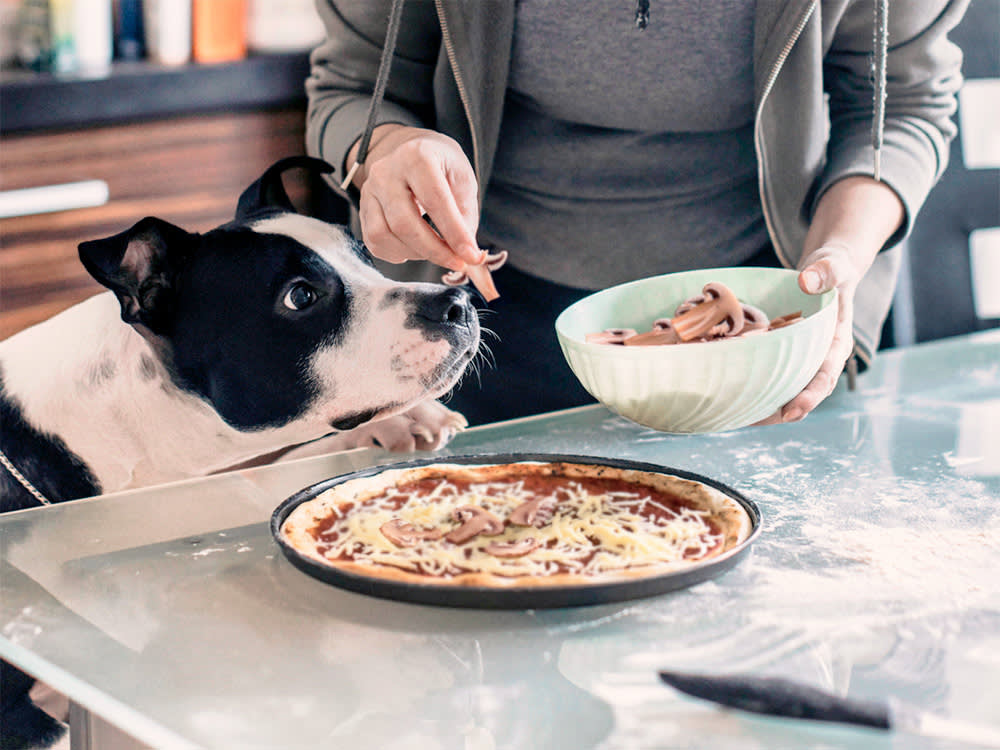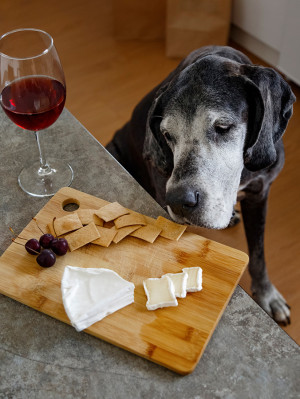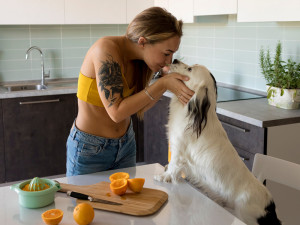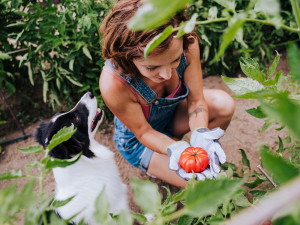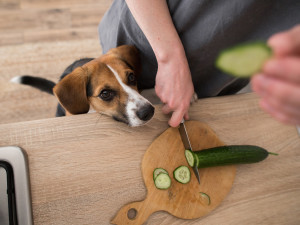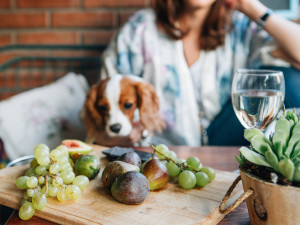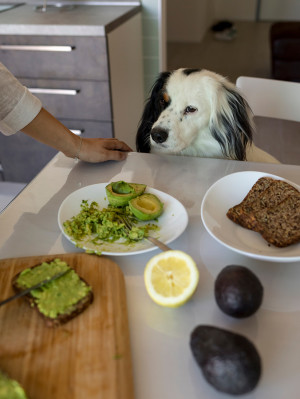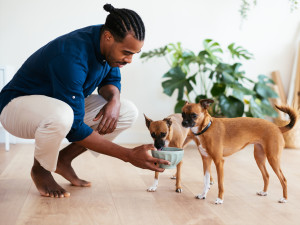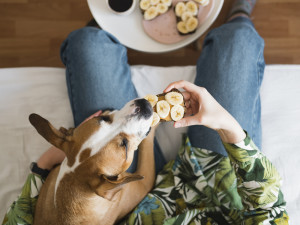Can Dogs Eat Mushrooms?
Your dog is a fun-gi, but be careful which shrooms they eat.
Mushrooms are a culinary wonder. They are technically a kind of fungus that grows on decomposing material, which — let’s face it — sounds kind of gross. And yet, they are known to trigger the umami taste receptors, which provide a unique, savory flavor experience that only a handful of foods offer.
There are more than 2,000 known varieties of mushrooms out there in the world. While many mushrooms are considered edible and may even have profound health benefits, others can be highly toxic, and still others can induce hallucinations and a love for tie-dye. When it comes to sharing mushrooms with your dog, the general rule is that if it is safe for humans to eat, it’s usually safe for dogs. But dogs should not eat wild mushrooms they find growing in the yard or consume psychedelic mushrooms. Read on to learn all about sharing mushrooms with your pup.
Nutrition facts about mushrooms for dogs
Mushrooms are often considered superfoods, due to claims of their amazing health benefits. These benefits mainly come from bioactive compounds found in certain mushrooms that may have antioxidant, antimicrobial, and/or anti-cancer benefits along with many other possible perks.
Some mushrooms are also being studied for their immune-boosting properties, as well as protective effects on the heart, liver, and more. For these reasons, mushrooms are often used in traditional medicine as well. There are many varieties of mushrooms that are safe to eat. The most common ones sold in the U.S. include white button mushrooms, portobellos, chanterelles, creminis, morels, oysters, and shiitakes. When it comes to their nutritional properties, mushrooms tend to be low in fat and calories while supplying important vitamins, minerals, and nutrients.
Are mushrooms good for dogs?
Mushrooms are good for dogs in moderation. They can provide important nutrients, as long as they are part of a complete and balanced diet. Some of the benefits of mushrooms include:
Gut health: While mushrooms are not as high in fiber as many fruits and vegetables, they provide a unique combination of fiber and polysaccharides that are very beneficial to the good bacteria in the gut. These nutrients provide food for the microbiome, helping to promote their growth.
Minerals: Many mushrooms contain important minerals like potassium, selenium, and phosphorus, which are important for normal biological functions throughout the body.
Vitamins: Mushrooms are often rich in B vitamins. These vitamins have many critical roles throughout the body. Some mushrooms may also contain vitamin D, another crucial vitamin, depending on how they were grown. These are all required nutrients for dogs and commercial dog foods provide adequate amounts of these vitamins, too.
Bioactive compounds: The list of bioactive compounds in mushroomsopens in new tab is very extensive, and many are currently being studied to learn more about exactly how they work.
Can dogs eat wild mushrooms?
This is a big no-no. Wild mushrooms are often highly toxic and can look nearly identical to edible mushrooms. Dogs certainly don’t know the difference, and many lack discerning palates and may want to taste anything they find in the yard. It’s very important to remove any mushrooms from areas where your dog wanders unsupervised. If you are out for a walk, be sure to keep your dog away from wild mushrooms, too.
Mushrooms from the Amanita species, often called “death cap mushrooms,” are the most toxic and signs of toxicity include vomiting, diarrhea, sedation, and neurologic signs. This can progress to fatal kidney and/or liver failure. Another one to be aware of is the gyromitra mushroom, also called the false morel. There are some sources that claim this is an edible mushroom, but there are well-documented cases of toxicity, even when it is cooked, and it should be avoided.
Other wild mushrooms are also highly toxic and can cause a variety of signs. If you see your dog eat a wild mushroom, remove as much of it from their mouth as you safely can, and then get to a vet right away. You might be able to get help identifying the type of mushroom through the North American Mycological Associationopens in new tab, so be sure to take a photo or save a piece of the mushroom if possible.
Are mushrooms completely safe for dogs?
Mushrooms are safe for dogs, as long as you stick to sharing the common kinds of mushrooms available in grocery stores. You should not allow your dog to eat wild mushrooms of any kind (or the kinds of illicit mushrooms sometimes used for their psychedelic effects in people).
Both of these can be toxic to dogs, with many varieties causing life-threatening complications. When it comes to edible mushrooms from the grocery store, they are safe for dogs, as long as you follow some basic guidelines:
Beware of other ingredients: If you are hoping to share a prepared dish with your dog containing mushrooms, double-check that the other ingredients are also safe for your pup. Many times, prepared dishes contain other possible toxins or ingredients that are unhealthy for our dogs including garlic, onion, lots of salt, or high-fat ingredients, such as butter, cheese, and/or fatty meats. If you want to share mushrooms with your dog, simple, plain, preparations are best. You can even set aside a small portion of cooked mushrooms for your pup before you season the rest of the dish.
Avoid wild mushrooms completely: Many wild mushrooms are highly toxic and can look nearly identical to edible mushrooms. Do not let your dog eat mushrooms growing in the yard or out on walks.
Avoid psychedelic mushrooms: While magic mushrooms may be having a resurgence in popularity among some people, they are definitely off-limits for dogs. They can induce hallucinations in dogs that cause extreme anxiety and put them at a high risk for injuring themselves in their distressed state. They can also cause high blood pressure, dangerously high body temperatures, seizures, or even coma if enough is consumed.
The bottom line: Can dogs eat human food?
Dogs can share in many delicious human foods, especially whole foods like many fruits, vegetables, and lean meats. It’s important to double-check that any foods you want to share with your dog are safe and non-toxic for them as there are some foods that should never be shared.
And while we all love to indulge in the occasional snack with our pups, it’s important to keep those snacks to a minimum to ensure they don’t over-indulge, putting them at risk for weight gain. It’s also crucial to limit treats and table snacks so they get the majority of their diet from a complete and balanced dog food diet. This will meet all of their nutritional needs and prevent them from developing any deficiencies that can cause illness. As always, consult your vet if you have questions about what kinds of foods are safe for your dog, especially if your dog has pre-existing health problems.
Other foods that are good for dogs
Broccoli can be a healthy snack in moderation.
These snacks can give your pup a burst of nutrients, too.
Blueberries can also be a sweet, juicy treat.
Other foods that are dangerous
Raw dough can make your pup very sick.
Raisins and grapes are toxic for dogs, too.
Avocado isn’t great for dogs, either.
FAQs (People also ask):
How many mushrooms can a dog eat?
Mushrooms, like all snacks, should be limited to less than 10 percent of a dog’s total diet.
Is it OK to give dogs mushrooms?
Mushrooms that are safe for people are also safe for dogs. Like any new food, it’s important to start with just a small taste and make sure there are no adverse effects.
Why do dogs like mushrooms?
Dogs may like the shape of mushrooms because they are round like balls or other toys. They may also like the flavor, especially when cooked with other aromatic foods.
Can dogs eat mushrooms?
Dogs can eat mushrooms, as long as they are considered edible mushrooms for people, such as the kinds sold in grocery stores.
Are psychedelic mushrooms safe for dogs?
Psychedelic mushrooms are toxic for dogs; they can hallucinate and injure themselves as a result. They also have more serious side effects, including seizures and coma.
